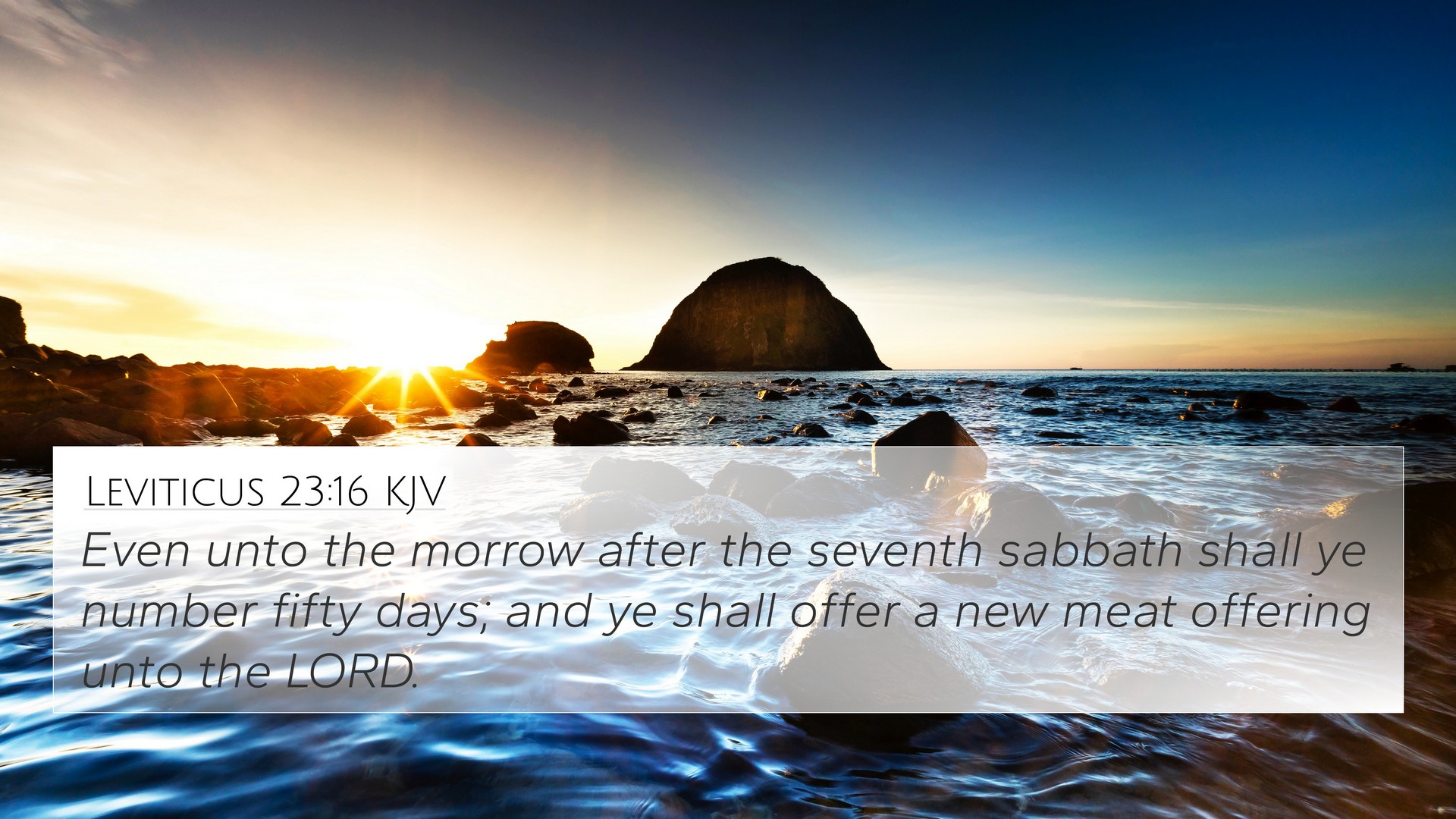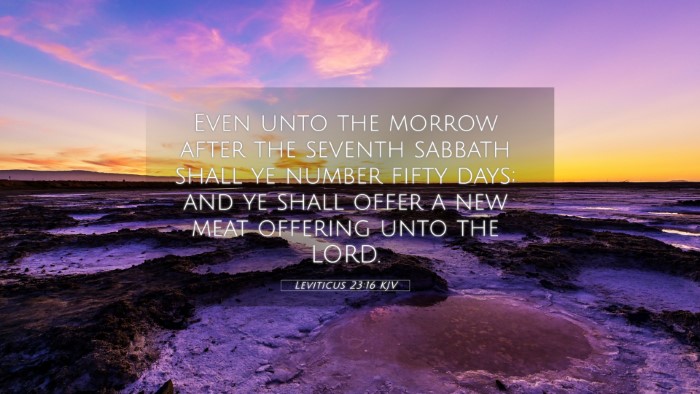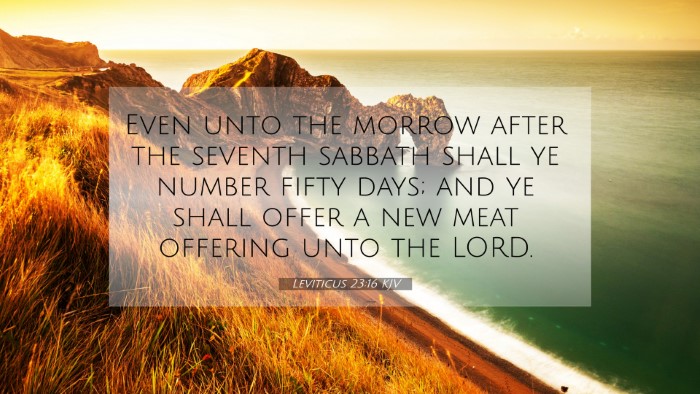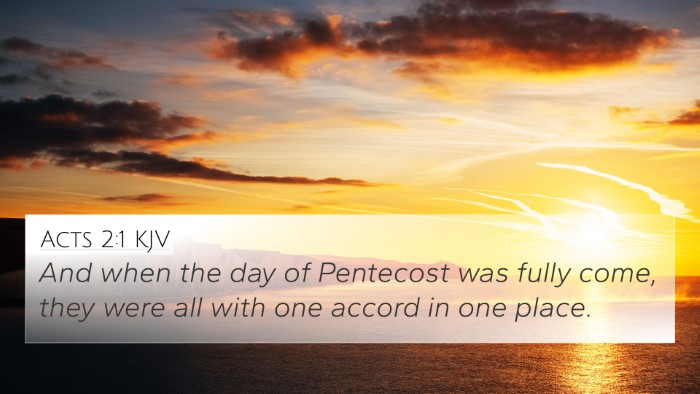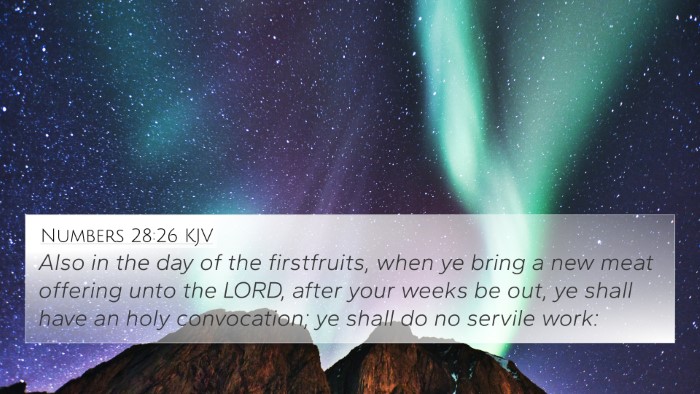Understanding Leviticus 23:16
Leviticus 23:16 states: "Even unto the morrow after the seventh sabbath shall ye number fifty days; and ye shall offer a new meat offering unto the Lord."
This verse highlights the instruction to count fifty days after the completion of the seven sabbaths, leading to the festival of Pentecost. Below is an analysis of the verse's meaning based on insights from public domain commentaries.
Summary of Commentary Insights
This verse serves a dual purpose: it provides a numerical guideline for the Israelites to follow and marks a significant festival in the Jewish calendar. The fifty-day count emphasizes preparation and anticipation for the offering before God.
Various commentaries provide deeper insights into this verse:
-
Matthew Henry: Henry points out that the counting of fifty days symbolizes spiritual readiness and the joy associated with the harvest. This count transitions the Israelites from the celebration of the Passover into the festival of Weeks, emphasizing the connection between divine providence and human appreciation.
-
Albert Barnes: Barnes elaborates on the significance of the "meat offering" and its proper presentation to God. He emphasizes that this new grain offering indicated gratitude towards God for the harvest and served as a reminder of their dependence on His provision.
-
Adam Clarke: Clarke remarks on the ritual aspects of the offering, noting that it involved specific agricultural practices and reflected the agrarian lifestyle of the Israelites. He also ties it to the concept of corporate worship, reinforcing community through shared offerings.
Connections Between Bible Verses
Leviticus 23:16 has several cross-references that add depth to its meaning. The following verses illustrate related themes and connections:
- Acts 2:1-4: The event of Pentecost in the New Testament corresponds to the fifty days after the resurrection of Christ—a pivotal moment for believers, paralleling the giving of the Law at Sinai.
- Exodus 34:22: This verse discusses the Feast of Weeks, establishing a thematic link to Leviticus 23 and reinforcing the continued importance of this festival in the Israelite religious calendar.
- Deuteronomy 16:9-10: Provides further directives on counting the fifty days and presenting offerings, emphasizing the continuity of worship through generations.
- John 4:35: Christ's teaching on the fields being ripe for harvest connects to the agricultural backdrop of the festival, illustrating the spiritual harvest of souls in contrast to physical harvests.
- Hebrews 2:10: Highlights the significance of God's plan for humanity as reflected through celebratory offerings, showing the intertwining of Old and New Covenant offerings.
- 1 Corinthians 15:20: Paul refers to Christ as the firstfruits of the resurrection, echoing the themes of harvest and new beginnings present in Leviticus 23:16.
- Psalm 147:13-14: Speaks about God strengthening the bars of Jerusalem and blessing its children, which can reflect the themes of divine provision celebrated during the feast.
Thematic Bible Verse Connections
The themes present within Leviticus 23:16 provide frameworks for understanding broader biblical concepts. These connections emphasize:
-
Divine Provision: The principle of God providing for His people is echoed throughout Scripture, linking physical harvests with spiritual blessings.
-
Community Worship: The emphasis on communal presentation of offerings fosters a culture of shared faith and reliance on God within the Israelite community.
-
Anticipation of Fulfillment: The period of count signifies an awaiting—this theme continues into New Testament teaching about the fulfillment of God’s promises.
Conclusion
Leviticus 23:16 serves as a reminder of the intersection between God's commands, agricultural reliance, and communal worship. By understanding this verse within the context of cross-references, one can appreciate the continuity of themes throughout the Bible. The interconnectedness presented in the scriptures encourages believers to explore the rich tapestry of divine truth.
Tools for Bible Cross-Referencing
As one delves into comparative Bible verse analysis, resources like a Bible concordance or a Bible cross-reference guide can facilitate deeper study. Understanding how to identify connections between Old and New Testament offerings enriches one's spiritual journey and enhances understanding of the Scriptures.
